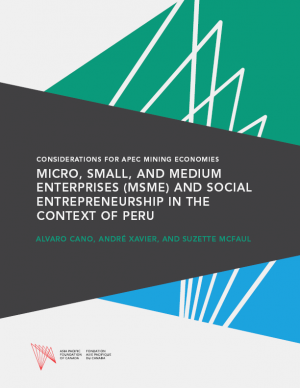Several Asia-Pacific Economic Cooperation (APEC) countries could fit the definition of a mining-dependent country put forth by the International Council on Mining and Metals. Within these APEC economies, either a) natural resource exploitation accounts for more than 20% of export earnings; or b) natural resource rents are more than 10% of gross domestic product (GDP). In the context of the Asia Pacific region and according to the APEC Mining Task Force, “almost 70 per cent of all mining output is produced and consumed in APEC member economies.” Although high-income countries such as Australia, Chile, Russia, the United States, and Canada are the biggest producers of minerals, they are not as economically dependent upon the extractive sector. In contrast, underdeveloped countries are increasingly dependent on this sector.
Over the past 20 years, Peru has demonstrated steady economic growth, doubling its GDP since 1990, and the extractive sector has played an important role in this growth. An assessment of the impact of mining on Peru’s national economy reveals that, although it generates at least 11% of the GDP and 60% of the total country’s exports, it also generates 60% of social conflicts. Most of these conflicts are related to the distribution of benefits of extractive operations at the local level. The majority of large-scale mines in Peru operate in remote regions above 2,000 metres in altitude where mining is the main economic activity. Because these regions have significant limitations with respect to institutional, infrastructural, and human capacities, they are limited in how they can take advantage of the opportunities that the extractive sector can create. Although the 2014 Peruvian National Plan for Productive Diversification seeks to promote MSMEs, the challenge of equitable economic growth persists.
Additionally, the way in which women contribute to the Peruvian economy has been under-explored for a variety of reasons. In the APEC countries, there are approximately 600 million women in the labour force, and over 60% of these are in the formal sector. In Peru, 32.3% of women do not have an income, and this number is exacerbated at subnational levels. For instance, in Cajamarca, San Martin, and Apurimac (mining regions), 39% of women are still economically dependent on men. This research aligns with the vision statement outlined in the 2017-2020 Small and Medium Enterprises Working Group Strategic Plan under the APEC Mining Task Force, which highlights the need to promote the development of gender-inclusive and enduring MSMEs that are well-prepared to meet the challenges of the 21st century.
With the above in mind, this research investigates how public policies regarding MSMEs in Peru enable a favourable environment for businesses in mining regions. Furthermore, it considers how MSME policies in Peru support social entrepreneurship (SE) in mining regions. In the process of investigating the main research questions, special attention was given to the role of women in MSMEs. The investigation also analyzed whether existing MSME policies take gender perspectives into account.
